Description
Description:
This GY-530 VL53L0X LASER Distance Sensor is a carrier/breakout board for ST’s VL53L0X laser-ranging sensor, which measures the range to a target object up to 2 m away. The VL53L0X uses time-of-flight measurements of infrared pulses for ranging, allowing it to give accurate results independent of the target’s color and surface. Distance measurements can be read through a digital I²C interface. The board has a 2.8 V linear regulator and integrated level-shifters that allow it to work over an input voltage range of 2.6 V to 5.5 V, and the 0.1″ pin spacing makes it easy to use with standard solderless breadboards and 0.1″ perf boards.
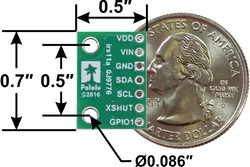 |
The VL53L0X from ST Microelectronics is a time-of-flight ranging system integrated into a compact module. This board is a carrier for the VL53L0X, so we recommend careful reading of the VL53L0X datasheet (1MB pdf) before using this product.
Overview:
Ranging measurements are available through the sensor’s I²C (TWI) interface, which is also used to configure sensor settings, and the sensor provides two additional pins: a shutdown input and an interrupt output.
The carrier board includes a low-dropout linear voltage regulator that provides the 2.8 V required by the VL53L0X, which allows the sensor to be powered from a 2.6 V to 5.5 V supply. The regulator output is available on the VDD pin and can supply almost 150 mA to external devices. The breakout board also includes a circuit that shifts the I²C clock and data lines to the same logic voltage level as the supplied VIN, making it simple to interface the board with 3.3 V or 5 V systems, and the board’s 0.1″ pin spacing makes it easy to use with standard solderless breadboards and 0.1″ perfboards. The board ships fully populated with its SMD components, including the VL53L0X, as shown in the product picture.
For for similar alternatives to this sensor, see our shorter-range 60 cm VL6180X carrier and longer-range 400 cm VL53L1X carrier. Both of these are physical drop-in replacements for the VL53L0X carrier, but they have different APIs, so software for the VL53L0X will need to be rewritten to work with the VL6180X or VL53L1X.
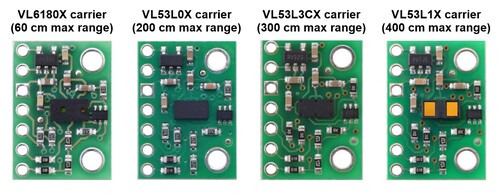 |
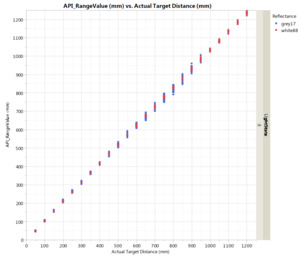 |
| VL53L0X datasheet graph of typical ranging performance (in default mode). |
|---|
Specifications
- Dimensions: 0.5″ × 0.7″ × 0.085″ (13 mm × 18 mm × 2 mm)
- Weight without header pins: 0.5 g (0.02 oz)
- Operating voltage: 2.6 V to 5.5 V
- Supply current: 10 mA (typical average during active ranging)
- Varies with configuration, target, and environment. Peak current can reach 40 mA.
- Output format (I²C): 16-bit distance reading (in millimeters)
- Distance measuring range: up to 2 m (6.6 ft); see the graph at the right for typical ranging performance.
- Effective range depends on configuration, target, and environment.
- The datasheet does not specify a minimum range, but in our experience, the effective limit is about 3 cm.
pin configuration:
| PIN | Description |
|---|---|
| VDD | Regulated 2.8 V output. Almost 150 mA is available to power external components. (If you want to bypass the internal regulator, you can instead use this pin as a 2.8 V input with VIN disconnected.) |
| VIN | This is the main 2.6 V to 5.5 V power supply connection. The SCL and SDA level shifters pull the I²C lines high to this level. |
| GND | The ground (0 V) connection for your power supply. Your I²C control source must also share a common ground with this board. |
| SDA | Level-shifted I²C data line: HIGH is VIN, LOW is 0 V |
| SCL | Level-shifted I²C clock line: HIGH is VIN, LOW is 0 V |
| XSHUT | This pin is an active-low shutdown input; the board pulls it up to VDD to enable the sensor by default. Driving this pin low puts the sensor into hardware standby. This input is not level-shifted. |
| GPIO1 | Programmable interrupt output (VDD logic level). This output is not level-shifted. |
Package Include
1 x GY-530 VL53L0X LASER Distance Sensor
Supply current: 10 mA (typical average during active ranging)Supply current: 10 mA (typical average during active ranging)Ranging measurements are available through the sensor’s I²C (TWI) interface, which is also used to configure sensor settings, and the sensor provides two additional pins: a shutdown input and an interrupt output.datasheet does not specify a minimum range, but in our experience, the effective limit is about 3 cm.

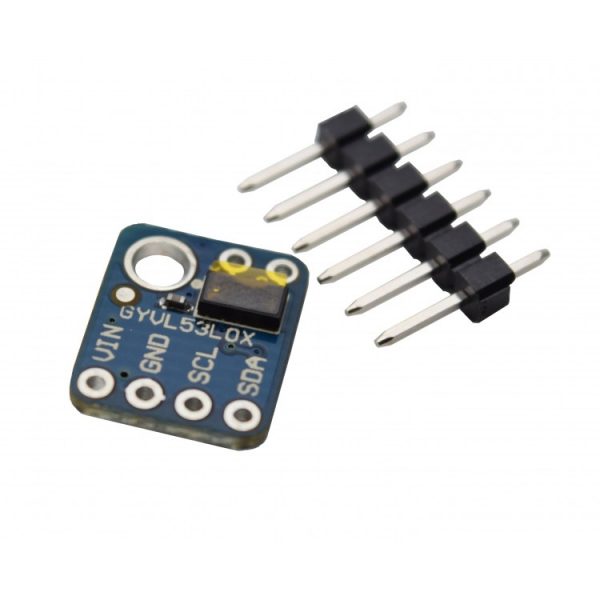


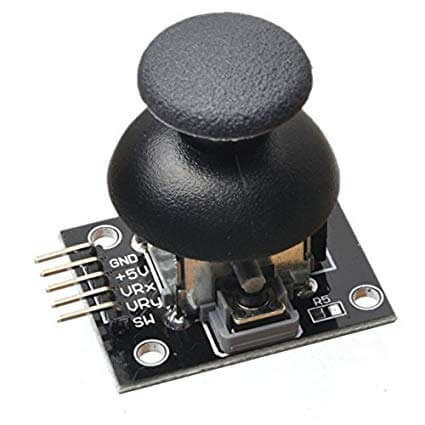










Reviews
There are no reviews yet.